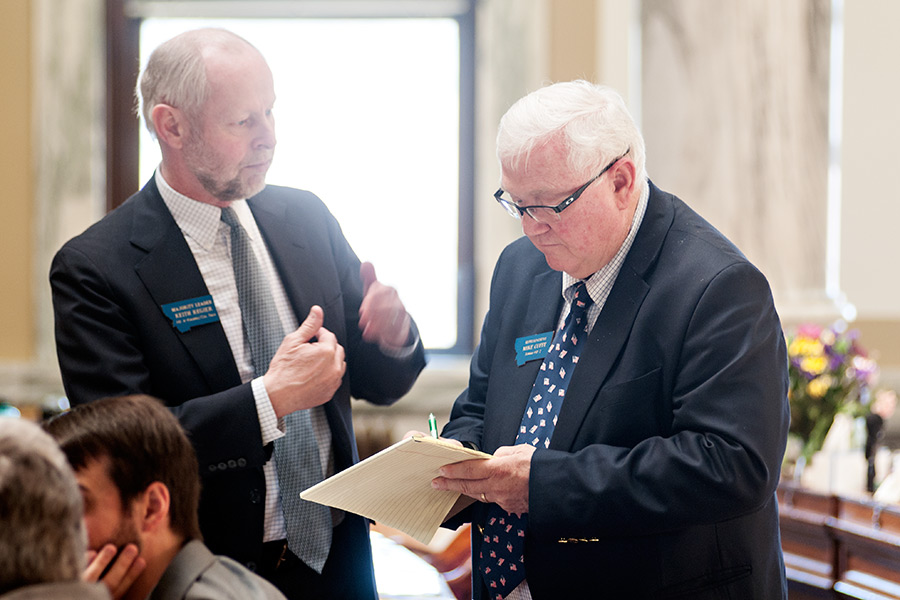HELENA – As if the 2015 Montana Legislature needed a more succinct metaphor to sum up the last four months of spirited public policy debate, one emerged in the waning days of the 64th session in the form of the state’s sprawling budget-and-infrastructure package.
Actually, it had been there all along, steeping in the diverse ideological pool of 150 citizen lawmakers who converged on the Capitol Jan. 5 with a single constitutional obligation – to pass a two-year state budget. But on days 83 and 84 of the 90-day session, it reared its head as legislators went to work with the overriding goal of passing the budget and closing out the session a week early.
The final bone of contention was Senate Bill 416, the public works bill that requires at least $150 million in cash, bonding and borrowing authority to finance a slate of local public-works projects and construction of new state buildings on college campuses and elsewhere.
Some Republicans wanted less borrowing and more cash, while Democrats who worked to craft the bill said it struck a balance that demonstrated sound fiscal responsibility.
The bipartisan bill appeared on the cusp of passing the House on April 23 when the body endorsed it in a 70-30 vote. Because the bill creates state debt, it requires approval by two-thirds of both the House and Senate, or 67 votes in the House.
In the course of late-night talks, however, six legislators had a change of heart, and when SB416 came before the House for a third reading and final vote on the morning of April 24, it went down 64-36, three votes shy of what was needed.
Gov. Steve Bullock, whose earlier $400 million infrastructure bill was rejected, called the compromise proposal a good plan, and refused to yield to hardline conservatives as a number of Republicans came around to support it, including House Speaker Austin Knudsen, who helped negotiate the final product and encouraged his caucus to approve it.
“I have said all throughout this session that I am willing to work with both parties to do what’s right for Montana,” Bullock said. “I’m hopeful that over the weekend legislators will put politics aside, recognize that this bill will create jobs, and come back on Monday ready to finish their work.”
But over the weekend, a bloc of conservative Republicans, many of them from Flathead County, tightened its grip on the last vestige of the caucus’ core mission, which it had set out to accomplish when the session convened, and which by all accounts had been a failure.
“From a conservative standpoint, it may be the only thing we get in the session,” Art Wittich, R-Bozeman, said over the weekend as the caucus debated the infrastructure spending bill. “We have virtually lost everything we came here to accomplish, including truly compromise legislation.”
House Majority Leader Keith Regier, R-Kalispell, led the charge against accepting the bill and stood by his caucus, calling Bullock’s definition of compromise narrow.
“The idea that there has ever been a true compromise is fantasy. What we have come to learn is that as long as the Governor has the ability to veto infrastructure, or threatens to line item veto in exchange for votes, that the choice is either his way or no critical infrastructure funding at all,” Regier said.
On Monday morning, the House rejected SB416 in a final 66-33 vote, one shy of the required two-thirds. Following the vote, the House voted to adjourn for the session. The Senate later extended the session for another day, with plans to reconvene April 28, after the Beacon went to print.
“It’s a different game at this point in the session,” said freshman Rep. Al Oszewski, R-Kalispell, who opposed the infrastructure bill at every turn. “It’s driven by emotion and passion now. It’s no longer about the data. It’s no longer about discussion. It’s about emotion, arm twisting and expediency.”
Regier accused the governor of supporting a surfeit of bonds as a means to close the session with a $300 million surplus, and of investing in “Capitol projects” while foregoing spending on rural schools.
“The governor wants to keep borrowing money through bonds,” Regier said from his leadership office last week. “If we have the cash, why borrow when we don’t need to?”
He said he wanted to see “pet projects” like a new gym at Montana State University and a new building for the Montana Historical Society stripped from the spending bill, with more emphasis on new roofs and boilers for local schools.
“I stand behind the members of my caucus who have dedicated long hours to try to come to a compromise that meets the needs of our state. For many of us the thought of telling our constituents that a university needs a nicer gym or the Historical Society needs a new building before the local school can get a new boiler is beyond what we’re willing to do,” he said. “The governor is allowing these wants to be funded before the needs of his state.”
Saying he was pleased that his caucus had stood firm in opposition to SB416, Regier noted that moderate Republicans had defected from the conservative bloc to pass major legislation on issues like Medicaid expansion and the Flathead tribal water compact between the Confederated Salish and Kootenai Tribes and the state of Montana.
In its final bill requiring a two-thirds vote, the conservative bloc of legislators stymied the moderates from mustering the 67 required votes.
“The Republican caucus has a few members who have more liberal leanings than the majority, and that has certainly come out on issues like Medicaid expansion and the CSKT water compact,” Regier said. “I think for the most part the Flathead has been well represented, but there are a few issues that should disappoint people. Time will tell.”
